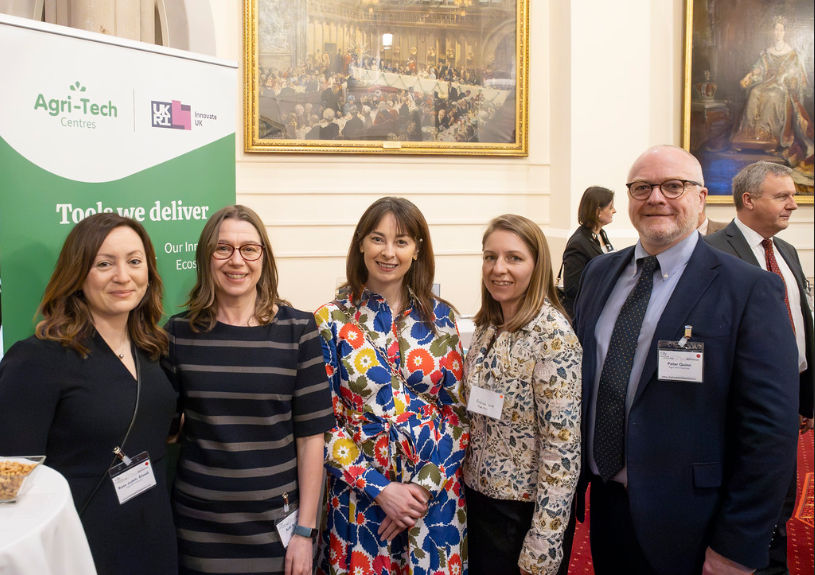Sainsbury’s CEO says close, longer-term partnerships are needed in the supply chain to build a more resilient food system.
The UK food system is a force for good, but the way it works together and is supported has to improve.
This was the central message of the 23rd annual City Food & Drink Lecture, which took place at London’s Guildhall on Monday 11 March. The event was proudly sponsored by UK Agri-Tech Centre and other key agri-industry organisations, promoting collaboration and responsible innovation across the supply chain.
The keynote speech was delivered by CEO of Sainsbury’s, Simon Roberts, who emphasised the need to bridge the divide been retailers on one side of the food system, and suppliers, processors and growers on the other.
A panel of industry leaders later discussed how changing our food system is one of the most impactful things we can do to address risks caused by climate change, nature loss and health risks for consumers. The evening concluded with a speech by HRH, The Princess Royal.
Technology adoption
Princess Anne spoke about the importance of technology in food production and shared her experience visiting a vertical farm, which demonstrated how water and energy efficiency can be improved to grow food.
Technology is increasingly being used to tackle the issues of climate change, food waste and is proving especially impactful in collecting data to provide insight throughout the supply chain for improved decision-making leading to more output from farms at lower costs.
Emerging technologies such as IoT, gene editing, and AI are just some examples that can help us achieve this and we have been highlighting in our recent ‘What is Agri-Tech campaign’. UK Agri-Tech Centre is working on a wide range of collaborative projects including:
- Computer vision and machine learning to detect and monitor cow lameness.
- Genetic improvement tools to enable low-methane sheep farming.
- GPS, sensors, and data analytics to optimise crop yields, reduce waste, and manage resources more efficiently
Food and climate change
There’s no escaping the fact that some traditional farming techniques produce substantial greenhouse gases.
Roberts acknowledged that ‘carbon is a huge issue as climate change reaches dangerous thresholds with humanity and is a significant threat to our food security.’ He also highlighted that food production accounts for 31% of all greenhouse gases and stressed the importance of boosting biodiversity in Britain. He mentioned that Britain is the most depleted nation in the G7 when it comes to biodiversity.
UK Agri-Tech Centre has undertaken ground-breaking research to demonstrate what the agri-food sector can do now to reduce emissions, but also, critically to identify the shortfall in research and technology.
One example is Dancing with Daffodils, a four-year feasibility study that aims to reduce global methane emissions by up to 30% by 2030 via a daffodil-derived feed additive.
Empowering a culture of collaboration
A recurring theme of the evening was the critical need to embrace collaboration.
Roberts acknowledged that, in the past, supermarkets’ relationship with growers, farmers, and the supply chain has “too often been short-term in outlook” and “not always as collaborative as any of us would have liked”.
He said a new culture of collaboration and longer-term partnerships were needed to drive change “at a system level” and create a more sustainable and resilient food system.
UK Agri-Tech Centre is helping to drive the change. We connect science and business to accelerate R&D to overcome agri-industry challenges such as net zero and improving animal welfare.
Phil Bicknell, CEO, UK Agri-Tech Centre said:
“The UK’s food and drink industry is the biggest manufacturing sector, larger than automotive and aerospace combined, and we are already making significant changes to deliver world-leading agri-innovations that sustain the environment, the economy and society.
We are pleased to sponsor such a prestigious event, sharing knowledge and engaging with other industry leaders and those actively involved in the food and farming sector.”
